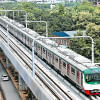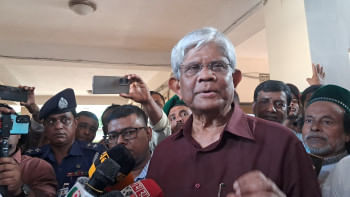From slumber to whirr of machines


Pitalganj, next to the Shitalakkhya and located around 1.5km south of Kanchan Bridge in Narayanganj's Rupganj upazila, is like any other village across the country.
Quiet and serene, it has almost the same socio-economic situation like the rest, where people earn their living mostly by farming or doing small businesses.
However, that scenario is about to change completely as the government is to build a depot of the country's first ever underground metro rail line there.
Though the place will witness new heights of development, it is the villagers who will have to pay a price for it, as at least 698 households will be affected due to the construction of the depot in a major portion of the village.
While a mosque, two temples, a madrasa and more such establishments will have to be relocated, over one lakh trees would have to be chopped down for the work, according to the resettlement action plan for MRT Line-1.
Prime Minister Sheikh Hasina will inaugurate the physical work of the project on February 2, setting off a flurry of activities for the second biggest infrastructure project in Bangladesh, after the Rooppur nuclear power plant project.
The civil works of the Tk 52,561.43 crore project, the biggest one in the transport sector, will start with land development for the depot on 92.97 acres in Pitalganj.
The authorities, however, said they will plant three times more trees than whatever will be felled for building the depot and have already paid compensation to almost all the households that need to be relocated.
The 31.24km rail line will have two parts -- a 19.87km part from Hazrat Shahjalal International Airport to Kamalapur (Airport route) will be underground, while an around 11.36km part will be elevated from Notunbazar to Purbachal (Purbachal route).
The airport route will have 12 stations and the Purbachal route will have nine, seven of which will be above the ground.
Two stations on the Purbachal route -- Nadda and Notunbazar -- will be underground and used as a transit for passengers to switch routes.
The Executive Committee of the National Economic Council approved the project in October 2019. Of the total cost, the government will provide Tk 13,111 crore and Japan Tk 39,450 crore as soft loan.
The physical work was supposed to begin in December 2020, but was delayed mainly due to a hold-up in completing the detailed design and the tendering process because of the pandemic.
For this, the authorities are unlikely to meet the fresh deadline set for December 2026.
Once completed, the rail line will be able to carry eight lakh passengers daily.
Dhaka Mass Transit Company Ltd (DMTCL), the implementing agency of the metro rail project, already signed a contract with a Japan-Bangladesh joint-venture firm to develop the depot. The firm of Japan's Tokyu Construction Co Ltd and Bangladesh's Max Infrastructure Ltd will do this within 910 days for Tk 607.65 crore.

SPOT VISIT
Upon visiting Pitalganj on January 17, this correspondent saw the area acquired by DMTCL for the depot was marked by concrete pillars and all the big trees in the area were marked with different numbers.
Around 11:30am, five to six people were seen chopping some of the marked trees down.
Fifty-year-old Abdul Mannan was one of them.
Abdul already received the compensation money as his 12.5 decimal land fell into the area acquired by the DMTCL.
"The trees are owned by one of my relatives. We were asked to clear the land, so the trees had to be sold out.
"I was born and brought up here. But now I have to leave the area."
Abdul has bought four decimals of land in Gausia area for his relocation, he told this correspondent.
A few yards away, three people were seen dismantling a house, while two others were taking apart another one.
Mazharul Islam, another villager, said that 25 decimals of his land was acquired for the project but he is yet to receive compensation.
"There are some disputes over the land's ownership, for which the payment is being delayed."
He, however, said the poor are not being adequately compensated as they have to pay at least 10 percent of it to local brokers, who have developed a strong syndicate, allegedly with the involvement of some local land office staffers.
Two staffers of Max Infrastructure Ltd were seen conducting surveys there to install instruments for monitoring purposes.
Asked, MAN Siddique, managing director of DMTCL, said they have paid all the compensation money to the district administration and most of the affected people have received their shares.
Asked about those who did not receive it, he said there may be some problems regarding land ownership, but those are only a few cases.
He added that, as per the law, they have paid thrice the existing price of land and twice the existing price of physical structures.
EFFECTS ON HOUSEHOLDS, TREES
At least 4,632 people have been identified as affected as they will lose their residential and/or commercial structures, trees, ponds and other minor infrastructures, reads the project document.
It added that 513 households will be displaced, while 404 households will lose their commercial structures, 21 will lose both homestead and commercial or business establishments, and 181 will lose their trees and other minor structures.
Moreover, 42 establishments like mosques, temples, educational institutions, graveyards, and offices will be affected, it said.
The project will require the felling 1,25,562 trees of various sizes and categories. Of those, 73,830 are large, 8,751 are medium, 5,507 are small and 37, 474 are saplings.
Asked about the cutting down of so many trees, MAN Siddique said they will plant three times what will be chopped down.
"You can see how many trees we have planted in the Diabari MRT Line-6 depot. We will do the same here," he told this correspondent on January 22.
He added that almost all the trees in the area have to be cut down as there are barely any of them along the metro rail alignment.

 For all latest news, follow The Daily Star's Google News channel.
For all latest news, follow The Daily Star's Google News channel. 








Comments